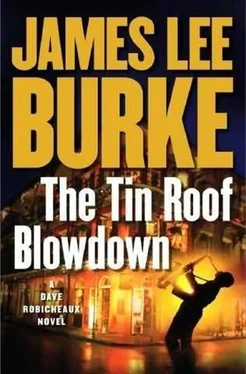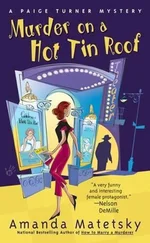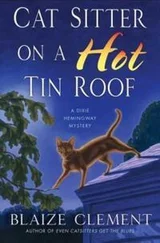James Burke - The Tin Roof Blowdown
Здесь есть возможность читать онлайн «James Burke - The Tin Roof Blowdown» весь текст электронной книги совершенно бесплатно (целиком полную версию без сокращений). В некоторых случаях можно слушать аудио, скачать через торрент в формате fb2 и присутствует краткое содержание. Жанр: Триллер, на английском языке. Описание произведения, (предисловие) а так же отзывы посетителей доступны на портале библиотеки ЛибКат.
- Название:The Tin Roof Blowdown
- Автор:
- Жанр:
- Год:неизвестен
- ISBN:нет данных
- Рейтинг книги:4 / 5. Голосов: 1
-
Избранное:Добавить в избранное
- Отзывы:
-
Ваша оценка:
The Tin Roof Blowdown: краткое содержание, описание и аннотация
Предлагаем к чтению аннотацию, описание, краткое содержание или предисловие (зависит от того, что написал сам автор книги «The Tin Roof Blowdown»). Если вы не нашли необходимую информацию о книге — напишите в комментариях, мы постараемся отыскать её.
Because he’s a damn good writer James Lee Burke knows how to keep a plot going from start to finish with no loose ends or out-of-the-blue surprises that amateurishly attempt to explain and finish off a narrative. He easily weaves several ancillary situations into the story line of The Tin Roof Blowdown. These are of interest on their own, but more importantly they serve to expand and add often curious layers to the main show that centers around the eye of mayhem left behind by a pair of hurricanes.
I bring this up since I just finished reading a book by Jeffrey Deaver titled The Cold Moon. The bad guy, a most interesting sociopath called The Watchmaker who is a brilliant killer with machinations of Machiavellian stature, is the author of a poem about a cold moon, so one would suppose that he would figure prominently in the denouement of the novel. He doesn’t. Not at all. He escapes from the cops and vanishes from the book with nearly one-hundred pages left, obviously setting a not-so-subtle stage for a return in another Deaver effort. This strikes me as venal artifice by a writer who certainly has reached a point of financial and critical security where such shenanigans are unnecessary and beneath him.
None of this fakery for Burke. From the first book I read by him years ago, The Neon Rain to others that included Black Cherry Blues, The Lost Get-Back Boogie, Jolie Blon’s Bounce, and now this one, Burke has played it straight telling his stories and making sure loose ends are tied up when the last page is read. And like I said he can write.
I said he smiled. That’s not quite right. Jude shined the world on and slipped its worst punches and in a fight knew how to swallow his blood and never let people know he was hurt. He had his Jewish mother’s narrow eyes and chestnut hair, and he combed it straight back in a hum, like a character in a 1930s movie. Somehow he reassured others that the earth was a good place, that the day was a fine one, and that good things were about to happen to all of us.
Tight, succinct descriptions like the one above or similarly structured vignettes connect and in doing so glide the reader from scene to scene. None of this is as easy as Burke makes it look. That’s called skill. He’s got it in spades.
But this is to be expected of a man who’s written more than twenty-five novels, a man who divides his time between seemingly disparate locations – Missoula, Montana and New Iberia, Louisiana. Living in these two places seems to give him an expanded and sympathetic view of the world and those of us who bump and grind our way through it making his characters and their short comings easily assimilated, allowing the reader to experience sympathy and often empathy.
The setting of The Tin Roof Blowdown is largely post-apocalypse Louisiana following the devastation wrought by first Hurricane Katrina then Rita. The landscape has been reduced to a naturally nuked wasteland where murder, rape and theft are the order of the day perpetrated by both punks run amok and many cops. Iberia Parish Sheriff’s Detective Dave Robicheaux is deployed to New Orleans, the once grand city now reduced to a feudal state without electrical power, clean water, food or any sense of societal order. Bloated bodies – humans, cats, dogs – float in flooded streets or lie tangled in downed, shattered trees. In this chaos Robicheaux must locate two serial rapists, a morphine-addicted priest, and a vigilante who quite possibly is more dangerous than the thugs looting the city and shooting at rescue helicopters overhead. Based on past books, just another day at the office for Robicheaux. Burke’s got so much going on here that it would be easy for him to inadvertently confuse the reader, if not himself, beyond salvation allowing the book to devolve into a miasma of none-related tales – a rag-tag collection of short stories pretending to be a novel.
Again his skill and also confidence as a writer never allows this to happen. Not even close. Each section and chapter advances the drama logically and without undo cliff hangings. A good example is when a killer stalking the detective’s daughter is spotted outside a cabin.
Out among the willows, I saw the solitary fisherman lean down in his boat and pick up something from the bottom. He knocked his hat off his head to give himself better vision and raised the rifle to his shoulder. I could not make out the features of his face, but the moon had started to rise and I saw the light gleam on his bald head inside the shadows.
I was already out the screen door and running down the slope when he let off the first round.
So many mystery writers would then wander off for a chapter or several on another tangent leaving a person wondering what’s going on back at the bayou. Not Burke. He again displays his confidence by moving directly forward with the above scene in the next chapter. He knows that each element in his books can stand on its own and doesn’t need the tired device of leaving the reader up in the air for pages on end to maintain interest in the overall narrative arc.
And Burke slips in sharp, humorous observations on the human condition throughout the book like this one following an argument between Robicheaux and his wife, a former nun.
I just went outside and started the truck, my face hot, my ears ringing with the harshness of our exchange. The yard had fallen into shadow and cicadas were droning in the trees, like a bad headache that won’t go away. Just as I was backing into the street, regretting my words, trying to accept Molly’s anger and hurt feelings, she came out on the gallery and waved good-bye.
That’s what happens when you marry nuns.
For those who’ve not yet read Burke, The Tin Roof Blowdown is a great place to start. For those who are already fans of his, this mystery is merely one more top-notch effort by a most talented author.













